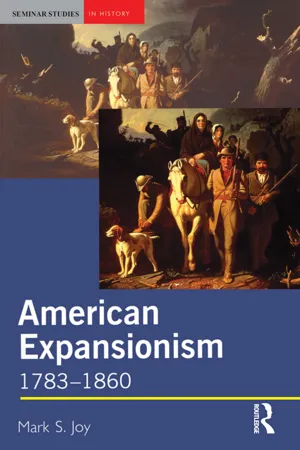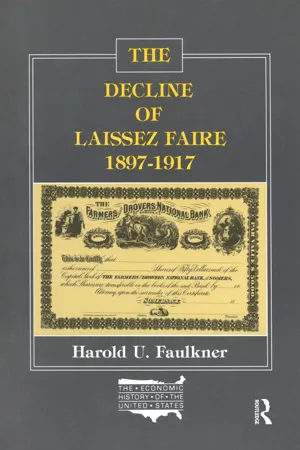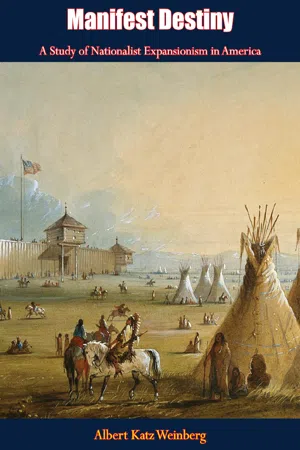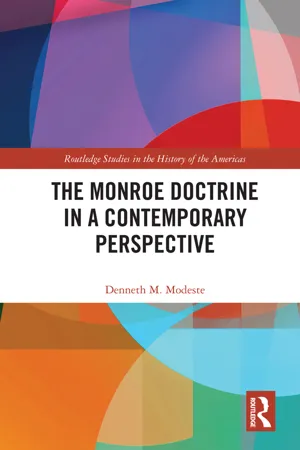American Expansionism
American Expansionism refers to the 19th-century ideology and policy that advocated for the territorial and economic expansion of the United States. It was driven by a belief in the nation's manifest destiny to expand across the North American continent and beyond. This expansionism led to the acquisition of territories such as the Louisiana Purchase, Texas, and the annexation of Hawaii.
7 Key excerpts on "American Expansionism"
- eBook - ePub
The Picky Eagle
How Democracy and Xenophobia Limited U.S. Territorial Expansion
- Richard W. Maass(Author)
- 2020(Publication Date)
- Cornell University Press(Publisher)
...foreign policy across two centuries. As the newest generation of diplomatic historians focuses largely on twentieth-century phenomena like the Cold War, this tendency continues to overshadow the historiography of U.S. territorial expansion. Although it has become a problematic generalization, the notion of U.S. foreign policy as continuously expansionist originated with a valuable insight, namely, that imperialism in the Philippines was not a “great aberration” from an otherwise innocent track record of U.S. foreign policy. 64 William Appleman Williams’s revision of that prevailing view in the late 1950s inspired numerous students to understand the U.S. shift from territorial to commercial expansion as one of “form” rather than substance. 65 Critics warned that this was oversimplifying. As Stuart Creighton Miller wrote, “Some scholars have not only refused to differentiate between continental and overseas expansion, but also make no distinction between formal empire and the more informal one involving indirect, largely economic, controls that the United States has long exercised in Latin America.” 66 Nevertheless, the tendency to conflate diverse forms of expansionism proliferated after 9/11, with a wave of books labeling the Bush administration’s War on Terror as the latest symptom of an ever-expanding “American Empire.” 67 The United States has never been truly isolationist, and demolishing that pernicious myth has been a valuable contribution, but by overselling continuity in the history of U.S. foreign policy, the American Empire literature has helped obscure meaningful variations within that history. 68 When historians of U.S. expansionism have offered explanations for the shift from territorial to commercial expansion, they have tended to share political scientists’ emphasis on profitability logic. 69 Williams himself argued that that shift was driven by profit: “The agricultural majority. . ...
- eBook - ePub
American Expansionism, 1783-1860
A Manifest Destiny?
- Mark Joy(Author)
- 2014(Publication Date)
- Routledge(Publisher)
...Sectional disputes ultimately derailed expansionism, and threatened the very existence of the nation itself. No common understanding or national consensus could be found on how to deal with the issues of slavery in the territories. As Richard White concludes, ‘The march toward an “empire of liberty” faltered before increasingly volatile sectional divisions. The imperial republic proved unable to forge a consensus for nationalist expansion’ (White, 1991: 73). America’s territorial expansion was no more destined than was its political development, the growth of its military power, or its dramatic economic progress. Continental expansion, like all of these other developments, was the result of direct, sustained action by a series of American politicians, statesmen, opinion makers, entrepreneurs, and pioneers over the course of nearly two generations. At times, the troubles of other nations provided unique opportunities (‘out of European distress came American success’), but such windfalls were not the driving force behind American expansion. Leaders such as Thomas Jefferson and James K. Polk – who surpass all other American presidents as expansionists – set specific goals that they believed were obtainable by diplomacy or military force. As Hine and Faragher have noted, attributing America’s territorial growth to something like Manifest Destiny ignores ‘the purposeful federal policy and the ruthless power that were necessary prerequisites to the conquest of the continent. The United States did not acquire an empire by doing what came naturally’ (Hine and Farragher, 2000: 200). Expansionists were able to put together the political coalitions needed to back acquisition of new territories because they sought specific goals and made convincing arguments that achieving these goals was necessary...
- eBook - ePub
Unto a Good Land
A History of the American People, Volume 2: From 1865
- David Edwin Harrell, Edwin S. Gaustad, John B. Boles, Sally Foreman Griffith(Authors)
- 2005(Publication Date)
- Eerdmans(Publisher)
...Also important was the sense of urgency to enter the race for empire and to ensure American access to overseas markets, in Asia especially, at a time when European powers were seizing control of land and trade in large parts of Asia and Africa. Changing intellectual currents, especially the spread of Social Darwinism among prominent educational and political leaders at home, and the growing influence of missionaries on American thinking about the world order and commerce, further extended American interests overseas. All such factors converged in the late nineteenth century to effect basic shifts in American policy and to provide the will, skill, and tools to make possible new American ambitions in the world. L IMITS ON E XPANSIONISM AND E MPIRE A general public ignorance of the world beyond American borders kept foreign policy issues out of mind until the end of the century. To be sure, politicians sometimes whipped up public anger by exaggerating some alleged insult to American territorial integrity and pride, a tactic especially productive of votes from Irish immigrants still resentful of British rule and arrogance. No one ever lost votes by “twisting the Lion’s tail.” Immigrants brought knowledge of and interest in their homelands with them to the United States, but the sheer diversity of immigrants muted any single immigrant/ethnic group’s ability to make its native country a subject of American support and governmental favor. American politics continued to focus on domestic questions, reinforcing Americans’ inward gaze. Even ostensibly foreign questions, such as Chinese exclusion, turned on domestic issues. Only the religious press regularly reported on events and needs overseas, largely in an effort to support missionary work or organize relief for victims of disease, famine, and religious persecution...
- eBook - ePub
- Harold Underwood Faulkner(Author)
- 2017(Publication Date)
- Routledge(Publisher)
...Chapter IV The Development of Economic Imperialism Background of Expansion IN the field of foreign relations the two decades 1897-1917 marked a new era in American history. These were years when American capital began to move aggressively outside the continental boundary lines, and the United States shifted from the status of a debtor nation to that of a creditor. This export of capital was consistently encouraged by the government in the Caribbean and the Far East, but in Mexico and Canada, the two chief outlets, the movement was quite voluntary and received little or no official backing. Although the Spanish-American War gave great impetus to the export of capital, particularly in the Caribbean, the war was not promoted by business interests. The real background of American imperialism seems to rest essentially on three factors: the economic development of the United States, the fact that the federal government from 1897 to 1913 was controlled by groups who favored expansion into foreign areas, and the belief that the United States must exercise control over the Caribbean area to build and defend a canal. By 1897 the economic development of the country had reached a stage where the domestic market was being supplied with manufactured as well as agricultural goods, and surpluses of commodities were seeking foreign markets. A certain proportion of American capital also found reasons for seeking foreign investment. Moreover, there were certain commodities which this country did not have in sufficient quantities, and which tempted capitalists to move elsewhere to obtain them. The frontier of good agricultural land had been occupied, industrial equipment created, and a transportation system largely built. Already the United States had become the greatest manufacturing nation in the world, equipped with the largest railroad mileage and producing the largest amount of agricultural products. By 1898 it was the richest and economically the most powerful nation in the world...
- eBook - ePub
American Exceptionalism and Civil Religion
Reassessing the History of an Idea
- John D. Wilsey(Author)
- 2015(Publication Date)
- IVP Academic(Publisher)
...In the nineteenth century, our tree’s stem splits in two. Because of rapid territorial expansion and the attending issue of the expansion of slavery, many expressed American exceptionalism in the years leading up to the Civil War as either (1) the closed exceptionalism of John L. O’Sullivan’s manifest destiny or (2) the open expression of exceptionalism of Abraham Lincoln. Since the Civil War, American exceptionalism as civil religion continued to be articulated in terms of closed and open, exclusive and inclusive, imperialist and exemplarist. In this chapter, I will give a brief background to territorial expansion and slavery, then lay out the aspects of exceptionalism as articulated by O’Sullivan and Lincoln. I will compare and contrast the two, and set the path for the remaining chapters of the book. Territorial Growth of the United States The story of American expansion in the nineteenth century is, if anything else, dramatic. When the United States won the Revolution, Jefferson thought it would take a hundred generations of Americans to fill up the lands east of the Mississippi River. Jefferson was among many who, at the end of the eighteenth century, thought that the North American continent might be peopled by sister republics at peace and harmony with the United States. Still, hardly anyone could have predicted the speed and efficiency by which the United States embraced the continent. But most Americans were elated to see it happen, especially those, like Jefferson, who profited from land speculation and slavery. The 1783 Treaty of Paris, which ended the Revolutionary War and brought British recognition of American independence, was particularly generous. The boundaries of the United States stretched as far west as the Mississippi River. But as expansive as the new nation was, the strategically important port of New Orleans was not part of US territory...
- eBook - ePub
Manifest Destiny
A Study of Nationalist Expansionism in America
- Albert Katz Weinberg(Author)
- 2020(Publication Date)
- Barakaldo Books(Publisher)
...This was not to disassociate nature from reason but rather to assume that reasonable dictates for politics were written in the territorial foundation of national life. The expansionists added to the idea of the natural boundary a metaphysical dogma which converted it into the theory that may be called geographical predestination. They quaintly held that nature or the natural order of things destined natural boundaries for nations in general and the United States, the nation of special destiny, in particular. The importance of geographical conceptions in early American Expansionism is a matter of common historical knowledge. Thus the foremost student of the acquisition of Florida has noted the idea that Florida “physiographically belonged to the United States.” {142} Again, in his Recollections, C. J. Ingersoll describes the ideal of early American Expansionism as “an empire of natural territories, boundaries, and circumadjacent waters, comprehending one and the same nation, by configuration exclusively vicinal.” {143} Such formulations, however, leave unanswered the question why the natural boundary was generally conceived by Americans to be far in advance of the boundary that they already had. This mystery of American history is the greater because in European history the principle of the natural boundary had figured chiefly, at least in theory, as a doctrine of restraint. Grotius gives numerous quaint examples of such a use of the principle in ancient history, among them being Pliny’s observation that “barriers...were destined for the separation of states.” {144} To Grotius and other jurists of the natural law school it seemed that nothing “is more suitable for separating...states than a boundary which is not easily crossed.” {145} In modern European history the doctrine of the natural boundary was employed by anti-imperialists as an argument against dynastic expansionism...
- Denneth M. Modeste(Author)
- 2020(Publication Date)
- Routledge(Publisher)
...had begun to claim as its sphere of influence. However, during the 1840s and 1850s, the U.S. territory as well as its ambitions expanded considerably. The move to expand was in line with the prevailing sentiment that the United States was entitled to settle the whole North American continent based on divine providence. In his First Annual Message to the Congress in December 1845, President Polk declared what has become known as the Polk Corollary of the Monroe Doctrine, by shifting the focus of the American proscription against European colonial adventures in the Western Hemisphere to European colonial activities in North America. He asserted the doctrine to justify American expansion on the continent and took exception to British attempts to restrain the United States in its efforts to acquire Texas. The French also explored options to circumscribe the activities and territorial expansion of the United States in North America. French Foreign Minister François-Pierre-Giullaume Guizot (the most prominent minister in the cabinet of Premier Nicolas-Jean de Dieu Soult) articulated one such option in June 1845: France has a lasting interest in the maintenance of independent states in America, and in the balance of forces which exists in that part of the world. There are in America three powers, the United states, England, and the states of Spanish origin…. What is the interest of France? It is that the independent states remain independent, that the balance of forces between the great masses which divide America continue, that no one of them become exclusively preponderant. In America, as in Europe, by the very fact that we have political and commercial interests, we need independent states, a balance of power. This is the essential idea which ought to dominate France’s American policy. It is not a question of protesting against the annexation of Texas to the United States, nor of going to war to prevent such an annexation if it should take place…...






